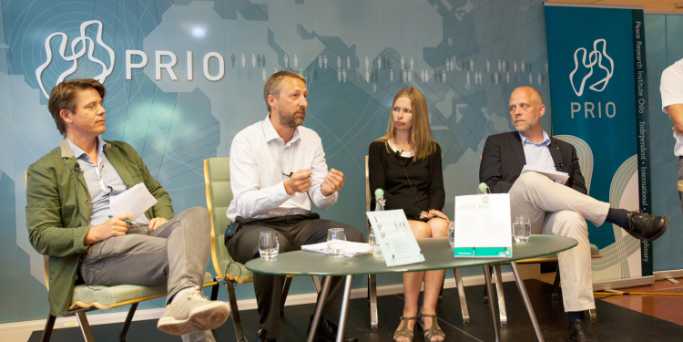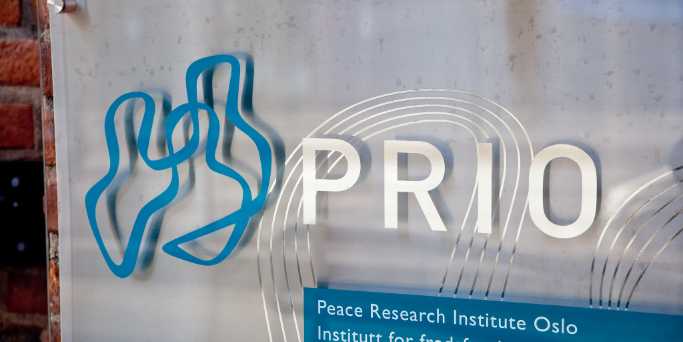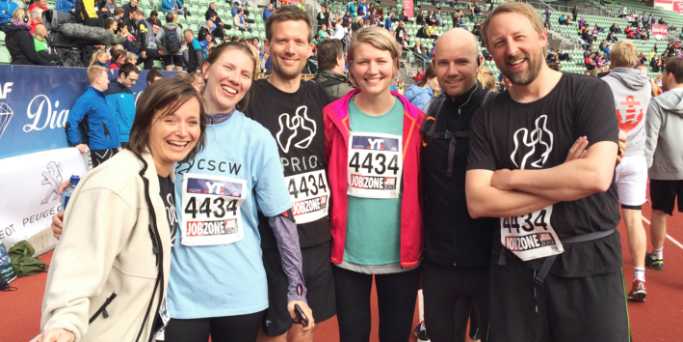HRS4R Action Plan
PRIO’s Action Plan for the implementation of the European Charter and Code for Researchers focuses on four main areas:
I Ethical and Professional Aspects II Recruitment and Selection III Working conditions and Social Security IV Training and Development
This page addresses each of these four main areas, and:
- Presents a brief overview of the relevant principles from the Charter and Code
- Provides an overview of the strengths and weaknesses of PRIO's current policy and practice
- Identifies actions points aimed at promoting the implementation of the principles at PRIO, including any concrete strategy implementation tasks, for which activities, responsibilities and timelines have been identified
I Ethical and Professional Aspects

Public seminar at PRIO
Charter and Code Principles
The Charter and Code principles relating to ethical and professional aspects state the responsibility of
researchers to:
- Focus their research for the good of mankind.
- Make every effort to ensure research is relevant to society and does not duplicate research previously carried out elsewhere.
- Ensure that the results of their research are disseminated, exploited and communicated.
- Ensure their activities are known to society in such a way they can be understood by non-specialists, thereby improving the public’s understanding of science.
- Be familiar with the strategic goals governing the research environment and funding mechanisms.
- Adhere to laws, regulations, standards and institutional Codes of Ethics appropriate to their discipline.
- Be familiar with intellectual property rights regulations.
- Be aware of regulations governing their working conditions.
- Deliver required results as set out in the contractual terms and conditions.
- Be aware that they are accountable towards their employers, funders, as well as, on more ethical grounds, towards the society as a whole.
- To adopt safe working practices.
Furthermore the principles relating to ethical and professional aspects state the responsibility of employers and funders to:
- Not discriminate against researchers in any way.
- Introduce appraisal systems for researchers for assessing their professional performance.
The Institute’s Priorities
PRIO’s purpose is to conduct research for a more peaceful world, a mission and skillset that is in increasing demand. Our ambition is that PRIO’s work shall be known by engaged excellence.
We are facing a rapidly changing world, with increasingly complex security challenges driven by technological change, weakened international norms, and states and societies increasingly turning inwards. As an incubator for innovative peace research, PRIO is committed to producing knowledge that can make a difference in the world and build peaceful relations between nations, groups and individuals. This requires ingenuity, versatility, and a diversity of scientific approaches. In partnership with our global network of leading research environments, PRIO will aim to systematically develop research programs that respond to the most pressing issues of our time.
To enable us to reach these ambitions, PRIO will develop proposals for large-scale multi-year research funding from the European Commission, the Research Council of Norway, and other public and private funders of research.
In the coming strategy period, PRIO will enhance the Institute’s presence in areas of importance to Norwegian and international policy makers in the field of peace and conflict. We will introduce a measure for systematically documenting impact of research on policy development. Furthermore, we will enhance our efforts to make all research output available to our audiences via PRIO’s website.
PRIO prioritises ensuring the Institute’s readiness for the introduction of the General Data Protection Regulation (GDPR). Furthermore, the new National Research Ethics Act reinforces the responsibility of the institutions for having routines in place for ensuring compliance with ethical standards in research. Finally, PRIO will update and extend the Institute’s internal quality assurance mechanisms of deliverables.
Action Plan
| Action Point | Timeline | Responsible Unit | Indicators / Targets |
|---|
| Adapt PRIO’s internal routines to the new National Research Ethics Act | Q2/2019 | Director’s Office | Internal routines for Research Ethics at PRIO in place |
| Review and update internal mechanisms for quality assurance of deliverables | Q2/2019 | Director’s Office | Updated internal routines for quality assurance of deliverables in place |
| Develop a user-friendly internal guide for project management at PRIO | Q3/2019 | Management Team | PRIO Project Management Guide in place |
| Strengthen PRIO’s open access policy | Q4/2018 | Communication Department | All articles published by PRIO researchers available via the PRIO web site |
| Ensure PRIO’s readiness for the introduction of the General Data Protection Regulation | Q2/2018 | Administration Department | PRIO’s compliance with the General Data Protection Regulation documented |
| Continue to disseminate PRIO’s research through various publication channels, high-quality conferences and seminars, the media, and through dialogue with policy-makers | Continuously | Research Departments | Record of dissemination in various publication channels |
| Enhance PRIO’s presence at arenas of importance to Norwegian as well as international policy-makers in the field of peace and conflict | Q3/2019 | Director’s Office | The introduction of a measure for systematically documenting the impact our research has on policy development |
II Recruitment and Selection

Charter and Code Principles
The Charter and Code principles relating to recruitment state the responsibility of
employers and funders to:
- Establish open, transparent and merit-based recruitment procedures.
- Clearly specify the entry and admission standards for researchers.
- Provide explicit guidelines for the recruitment of postdoctoral researchers.
- Ensure that the qualification criteria are in line with the needs of the position.
- Provide appropriate evaluation of academic and professional qualifications.
- Take into consideration the whole range of experiences of the candidates.
- Not penalise career breaks or variations of the chronological order of CVs.
- Recognise mobility experience.
- Ensure that selection committees bring together diverse competences.
- Inform candidates about the recruitment process and selection criteria.
The Institute’s Priorities
The Institute is already an attractive international employer, with top competence in its areas of research, a dynamic work environment, English as its working language, attractive premises and competitive compensation packages. It is our ambition that the institute shall remain an attractive employer for some of the best, most innovative, most productive and most influential people in peace research internationally.
PRIO is committed to open, transparent and merit-based recruitment processes. The advertising strategy for Researcher positions is tailored to the type of position advertised and includes national and international announcements. Promotion criteria for Researcher, Senior Researcher and Research Professor positions at PRIO have been developed, and these are reflected in the competence requirements stated in the vacancy announcements. In the search for new talent, PRIO emphasises academic excellence, as well as initiative and entrepreneurship. The candidate’s academic competence is evaluated by an external academic evaluation committee. The academic competence of a researcher applying for a personal promotion is evaluated by an external committee.
PRIO is an independent foundation, international in its orientation, with an extensive network of collaborators worldwide. PRIO celebrates staff diversity and will strategically invest in attracting a diverse pool of internationally competent applications to PRIO’s vacancies.
PRIO recognises the importance of researcher mobility and in this strategy period the institute will prioritise addressing the extra challenges faced by international staff by developing introduction packages for newcomers from abroad. Similarly, the Institute will support international exchange for current staff.
Action Plan
| Action Point | Timeline | Responsible Unit | Indicators / Targets |
|---|
| The Institute will enhance the competence of staff involved in recruitment and selection processes at PRIO | Q3/2018 | Administration Department | Provision of internal training session in OTM-R principles |
| Strategically invest in attracting a diverse pool of internationally competitive applicants to all PRIO vacancies | Q4/2019 | Administration Department | The increased diversity of applicants to PRIO positions, and of PRIO’s staff |
| PRIO will explore available funding opportunities for postdoctoral fellowships, and in this context assess the Institute’s policy for offering postdoctoral appointments | Q4/2019 | Administration Department | Update the Institute’s policy for offering postdoctoral appointments, subject to available funding |
III Working Conditions and Social Security

Part of PRIO's team for Holmenkollstafetten
Charter and Code Principles
The Charter and Code emphasise good working conditions for all researchers. Institutions should have supportive environment with a well-organised research-career infrastructure and provide family-friendly working conditions, also for researchers with disabilities. Funders should ensure that adequate resources are provided in support of the agreed work programme. To safeguard a gender balance among researchers, an equal opportunity policy should be carried out.
The Charter and Code principles relating to working conditions and social security, state the responsibility of
employers and funders to:
- Recognise researchers as professionals.
- Ensure the most stimulating research environment.
- Ensure working conditions deemed essential for successful research performance.
- Improve stability of employment conditions for researchers.
- Ensure researchers enjoy fair and attractive salaries and equitable social security provisions.
- Aim for representative gender balance among researchers.
- Draw up a career development strategy for researchers.
- Recognise the value of mobility for researchers.
- Offer career advice for researchers.
- Specify what intellectual property rights belong to the researchers and to the employer, and possibly other collaborating parties.
- View co-authorship positively.
- Value teaching options within researchers’ career paths.
- Establish proper procedure for addressing complaints.
- Recognise the legitimacy of researchers’ participation in decision-making bodies.
The Institute’s Priorities
The Charter and Code emphasise good working conditions for all researchers. Institutions should have supportive work environments with a well-organised research-career infrastructure and provide family-friendly working conditions, also for researchers with disabilities. Funders should ensure that adequate resources are provided in support of the agreed work programme. To safeguard a gender balance among researchers, an equal opportunity policy should be carried out.
PRIO prioritises the wellbeing of its staff. The value of working in a friendly environment with a high level of professionalism is appreciated and acknowledged by the staff. The Institute works continuously and actively to live up to being a competitive and attractive employer by providing a working environment in which researchers thrive. This includes the provision of arts, sports and social activities for employees.
PRIO is an equal opportunity employer and values staff diversity. The Institute has entered into the Government's agreement for a more inclusive working life and is recognised as an Inclusive Workplace (
read more about this agreement at regjeringen.no).
PRIO promotes gender equality at all levels within the organisation. It is a strategic objective to further increase the proportion of female Research Professors at PRIO, and the institute will continue to develop targeted activities based on the successful experiences of the
Positioning Women for Research Professorship (POWER) project.
Action Plan
| Action Point | Timeline | Responsible Unit | Indicators / Targets |
|---|
| Foster an organizational culture facilitating the co-existence of collegial collaboration and competition characteristic of academic excellence among PRIO researchers | Q3/2019 | Leader Team | A thriving working environment (work environment survey) |
| It is our ambition to remain an attractive and competitive employer for some of the best, most innovative, most productive, most influential people in peace research | Q3/2019 | Institute Director | A thriving working environment and competitive working conditions (Work environment survey) |
| PRIO will support the development of a project portfolio that promotes sound career development for researchers | Q4/2021 | Leader Team | Large scale, multi-years, researcher grants achieved (incl. H2020, ERC, Centre of Excellence, Young Research Talent grants) |
| Enhance arts, sports and recreational activities at PRIO, promoting the social work environment | Continuously | Institute HR Adviser | Arts, sports and social activities initiated |
| As an international employer, PRIO will facilitate researcher mobility by developing an introduction package tailored for international staff who are new to Oslo (and Norway) (including language training – social networks – who to ask, etc.) | Q4/2018 | Institute HR Adviser | Introduction package for newcomers and international staff in place |
| PRIO will facilitate project funded international exchange programmes for PRIO researchers | Continuously | Administration Department | Number of international exchanges |
| PRIO has recently completed a pilot programme Positioning Women for Professorship (POWER), designed to promote professor competence (incl. mentoring; mock evaluations; writing stipend; sabbaticals) and tailor a sustained effort to enhance gender equality among all groups of staff and researcher levels. Going forward, we will evaluate the outcomes of the programme in order to identify targeted follow-up measures | Q4/2021 | Leader Team | The increased proportion of female Research Professors |
IV Training and Development

Senior Researcher Ragnhild Nordås teaching a course at the Research School on Peace and Conflict
Charter and Code Principles
The Charter and Code principles relating to training, state the responsibility of
researchers to:
- Establish a structured and regular relationship with their supervisors and departmental representatives.
- Devote attention to their multi-faceted role as supervisors, mentors, careers advisors, research leaders, project managers, research coordinators and research communicators.
- Continually seek to update their skills and competencies.
Furthermore the principles relating to training aspects, state the responsibility of employers and funders to:
- Give researchers the opportunity for professional development.
- Identify to whom researchers can refer to for the performance of their professional duties and for supervision.
The Institute’s Priorities
PRIO’s investment in human resources is crucial to sustained success. All investments in human resource development at PRIO share the basic idea to further realize the potential which lies in PRIO’s staff. Investment in human resources starts with concerted leadership efforts, and includes all staff categories, from support staff through all researcher categories.
PRIO aims to institute an ambitious program for its PhD candidates geared to ensure progress, increase the quality of research and provide career support throughout the PhD.
Cognizant of the competitive and sometimes personally challenging nature of academic work at an international level, not least with a project-based funding model, PRIO actively invests in developing the academic and professional skills of all its staff.
Action Plan
| Action Point | Timeline | Responsible Unit | Indicators / Targets |
|---|
| Actively invest in career, academic and professional skills development of all staff | Q4/2019 | Professional Development Team | The initiation of:- Professional skills training
- Further education
- Academic writing
- Writing retreats in Greece
- Mentor programmes
|
| PRIO enhances good leadership, including the development of a continued leadership capacity within the organisation | Annually | Professional Development Team | The provision of training in leadership (knowledge management) for research leaders |
| PRIO aims to institute an ambitious programme for its PhD candidates geared to ensure progress, increase the quality of research, and provide career support throughout the PhD | Q4/2019 | Professional Development Team | PRIO PhD programme institutionalised |
 Public seminar at PRIO
Public seminar at PRIO

 Part of PRIO's team for Holmenkollstafetten
Part of PRIO's team for Holmenkollstafetten
 Senior Researcher Ragnhild Nordås teaching a course at the Research School on Peace and Conflict
Senior Researcher Ragnhild Nordås teaching a course at the Research School on Peace and Conflict





